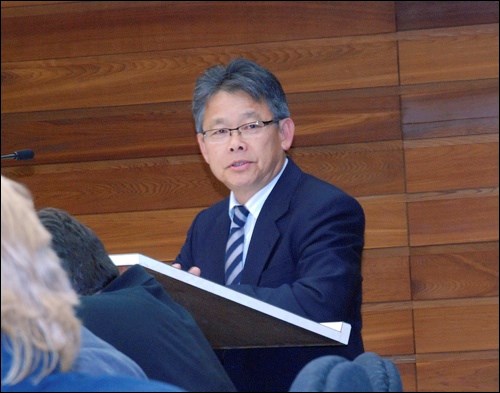The future of Saskatchewan Hospital and proposals to address the future of mental health care in the province came before North Battleford city council Monday night.
The approach outlined reiterated calls for the building of a new 188-unit Saskatchewan Hospital to replace the current 100-year-old structure. As well, Prairie North Health Region CEO David Fan outlined how the new Sask. Hospital would fit into a proposed new provincial strategy for addressing mental health care, one that would see an additional 120 beds set up in health regions around the province
Fan presented the executive summary on Sask. Hospital replacement - A Provincial Approach to Replace Saskatchewan Hospital and Address Complex Needs Care."
Fan's presentation was in line with what he had presented earlier in the day at a meeting with the Rotary Club. His purpose in being at council was to gain support for the revised strategy at the municipal level, as the health region continues lobbying efforts to seek provincial approval and funding for a new Saskatchewan Hospital.
Calls for a new facility have a long history. A redesign study began in 2006 and was completed in 2008. But since then the proposed design has been in a state of limbo, as construction has yet to commence and the go-ahead for funding the project has yet to be approved by the current government.
A re-scoping report was done of the entire project last year.
That study has since been completed. According to Fan, a revised conceptual design is being put forward for a new Saskatchewan Hospital. It is being proposed that the new facility would operate under a restructured system where "rehabilitative or complex mental health care" would be decentralized to key geographic regions of the province.
"Not only would patients be able to be closer to home and receive the care they need closer to home, but others who might otherwise not be afforded care because they do not wish to go to SHNB or because they are difficult to house, could be provided the care they need," stated the executive summary.
Fan's presentation gave an overview of how the proposed system would be set up. It would involve a proposed a new Saskatchewan Hospital located slightly northwest of the existing buildings, that would continue to serve persons with severe psychiatric illness and expand resources to serve complex needs cases, with an emphasis on improved safety, quality of life and quality of case. An emphasis would be placed on patient-centred rehabilitative care.
The new hospital's 188 beds would be 10 more than the number housed at the current facility. The plan would see an increase in forensic patients from 25 at the current facility to 42.
The 188 beds in the new facility is down from the 236 beds the original master plan had called for. However, the proposed new setup would establish more community residential options with additional beds spread out across the province.
A total of 40 intensive residential support beds would be set up in the health regions of Saskatoon, Regina, Prince Albert and Prairie North. Another 80 step-down beds would be located in those four regions, as well as in Five Hills Health Region. Including the number of beds at the new Sask. Hospital, that would bring the total to 308 beds across the province.
Fan's presentation concluded that the proposed provincial strategy "puts the needs of these highly vulnerable patients/clients first." Redevelopment of "Saskatchewan's only psychiatric rehabilitation hospital in the continuum of mental health care and services is long overdue," it was stated.
Fan's presentation also once again pointed out the deficiencies of the current facility, with patients and residents living in conditions "you and I would never accept."
Those include five-bed rooms, three-bed and two-bed rooms, "shared" bathrooms, and outdated and crowded conditions for staff. Pictures of these conditions were presented at council.
Fan pointed out Saskatchewan Hospital has never undergone a significant physical upgrade. Even after a 1978 fire destroyed an entire floor of the central building, that floor was only "closed off" and not maintained, and continues to deteriorate, he noted.
The comments of patients living in the facility were presented. Pictures were shown of patients quoted as asking for such things "better living conditions," a "private bed," "private bathrooms with running water and stall doors," "proper heat" and "Internet access and phone lines, as long as I can pay for them."
Fan said that the patients were asking for things "you and I take for granted."
"They don't have a voice," said Fan of the patients. "It is up to us to speak for them."
Fan asked for the City to support Prairie North's plan, referring to a short time frame to put it into action.
Fan had no trouble receiving support from city councillors, who have been backing a replacement to Saskatchewan Hospital for a long time.
"We certainly do support the rebuilding of Saskatchewan Hospital as has been proposed," said Mayor Ian Hamilton.
"We will do whatever we can within our powers to make it known to the powers that be."




